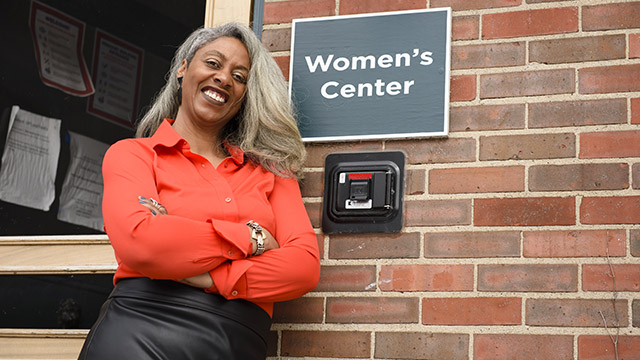Sekile Nzinga stepped into the role of interim chief diversity officer at Northwestern during a pivotal time in U.S. history: the COVID-19 pandemic and a nationwide push for social justice.
Nzinga, who has been a professor and higher education administrator for two decades, knew that she had to draw upon her background as an advocate and social worker to serve effectively and responsibly during this historic moment. She stabilized the Office for Institutional Diversity (OIDI) for almost 12 months, completed her second book, “Lean Semesters: How Higher Education Reproduces Inequity”, and helped university leaders strategically lead both large- and small-scale diversity, equity and inclusion (DEI) efforts.
The University recently welcomed Robin Means Coleman as she began her role as vice president and associate provost for diversity and inclusion and chief diversity officer. She and Nzinga will work together through their joint work within the Office of the Provost to advance diversity, equity and inclusion at Northwestern.
We sat down with Nzinga to discuss what’s next: for her, for the Women’s Center and for the University’s progress on DEI efforts.
What were some big takeaways from your time as interim CDO?
What I learned most was how amazing of a campus community we have that is committed to diversity, equity, inclusion and social justice. A few days before I began my interim post, I reached out to colleagues and students from across the University and asked them to meet me at the Women’s Center. I intuitively knew that I needed their support, their partnership, their guidance and yes, their grace, if I was going to be a successful leader of this critical institutional office. They showed up to the meeting and have continued to show up whenever I needed counsel on the issues at hand. What I learned from this experience is that there are not only brilliant people at Northwestern but there are truly committed people at Northwestern.
I have had the honor of working with people who deeply care about creating a top-ranked university that is renowned for being welcome to all as they pursue their educational and professional journeys. This community taught me how important it was to listen to the people on campus who were most impacted by inequality and marginalization to provide historical context before I propelled forward in a reactive way and missed the core and nuanced issues. I learned that informed, intentional and collaborative work produced a richer process and also the metric for a transformative and sustaining intervention.
I also learned long ago, and continue to learn, to stay humble and to not confound my well-intended efforts as progress, outcomes or impact. I can attest that I, and so many others, are putting in a great amount of effort into DEI here at Northwestern. Despite my best effort, I cannot assume that effort is synonymous with transforming the lived experiences of those on our campuses facing institutionalized inequity. This truth does not diminish my commitment nor does it signal failure. It simply grounds me and helps me in remembering to keep my eye on the prize of ensuring our students, faculty and staff actually feel our articulated measures of progress if we are to be truly successful in our efforts.
Is there an accomplishment you are particularly proud of?
I am quite proud of the launching of Gender Inclusive Initiatives, which grew out of the GQNBT Taskforce recommendations. As you may recall, Hector Carrillo and I had just released the taskforce’s report and recommendations to the University in February when COVID-19 changed everything. Shortly after, the uprising across the country in support of Black life activated the University in a powerful way. So, I had to pivot in this moment, but it was critical for me to honor the prior commitments I made to support our trans and non-binary faculty, staff and students. Luckily, I was not alone in that commitment and learned that many units across Northwestern were independently reading and reviewing the GQNBT Task force report and engaging in their own planning and implementation. I was so grateful for these fellow action leaders who did not let this important work float to the bottom, even with all the competing demands and strains for resources.
The Women’s Center and OIDI joined forces to build a webpage to share trans inclusive resources and to track our progress. I wrote a report that chronicled all the efforts that I learned were underway across the University. I also convened a core group of co-action leaders who had prior expertise and who had drafted comprehensive unit-level action plans. My approach to any effort is to be collaborative and to work with both academic and non-academic units. To that end, I am proud that the Gender Inclusive Initiatives at Northwestern has Multicultural Student Affairs (MSA), The Women’s Center, Gender and Sexuality Studies and OIDI collaboratively now at the helm.
But again, I say I am proud with caution and humility. Though I kept this work a priority, that does not mean I, as a cis person, have a full sense of what the experiences have been for our trans and non-binary students, faculty and staff over the past year. I do know that this pandemic has deepened and compounded marginalization for many groups navigating oppression, and I imagine that may be the case for many of our trans and non-binary colleagues and students here at Northwestern. Still, I remain committed to working to strengthen our supports, resources for trans and non-binary people and continue to value their experiences and expertise as our students and colleagues.
What is the status of the GQNBT Task Force, and what are next steps in the implementation of that report?
As you know, our work is in direct response and builds upon the decades of advocacy, leadership and research of trans, non-binary and queer members of our campus community. I plan to invite the Rainbow Alliance, the authors of the student survey that was conducted in tandem with the task force, the OutNetwork, and others to join me in revisiting the task force’s recommendations in light of COVID-19. I am curious to hear from trans and non-binary students, faculty and staff to explore whether the priorities we articulated in 2019 remain and if there are new or compounding issues that need to be captured as an addendum to the report. I also want to update these groups on what efforts are currently underway and to get their feedback. I learned that units leading gender inclusive initiatives are committed to getting this work right. They expressed with sincerity that they did not want to create trans affirming supports and resources that missed the mark and caused harm.
Finally, I will say I wish I had been able to accomplish more this past year but alas, I am but a mere mortal. I am deeply grateful for how much grace trans and non-binary folx gave me this year. I recall one instance when I was slated to meet with the MSA LGBTQIA Student Advisory Group right after George Floyd was murdered. Hours before the meeting, it disappeared from my calendar. I reached out to their advisor, Matt Abtahi, and he simply said the students gave me the gift of rest. Words cannot express how touching that gift was for me as a black queer woman to seen by others who also experience a disproportionate amount of trauma from police brutality and state violence. That was diversity, equity and inclusion happening in real time and I will carry that act of love and solidarity with me as I return to the work of supporting trans and non-binary folx here at Northwestern with my full energy.
What will be your role in DEI at Northwestern moving forward?
I am most eager to support the strategic DEI plans of our new chief diversity officer Robin Means Coleman and am truly excited to partner with such a brilliant and accomplished diversity leader! In the meantime, my primary role will be to continue to champion gender equity and inclusion here at Northwestern. It is quite fitting that I would continue my DEI work from my role as the director of the Women’s Center. The Women’s Center was one of the first and one of the few diversity centers serving faculty, staff and students at the University. It also has a long history of advancing DEI at Northwestern — our archives tell an impressive history! I was able to transition smoothly into the interim CDO role last year because I had already been involved in many of the University’s diversity initiatives from the past several years. Ideally, I would like to continue to be active in broad initiatives and partnerships that are aligned with the mission of the Women’s Center and that ensure the experiences of women, trans and non-binary individuals are centered in our institutional policies and priorities.


